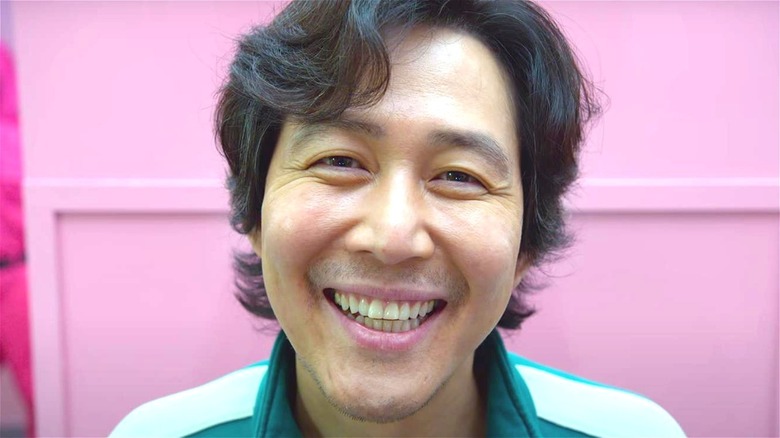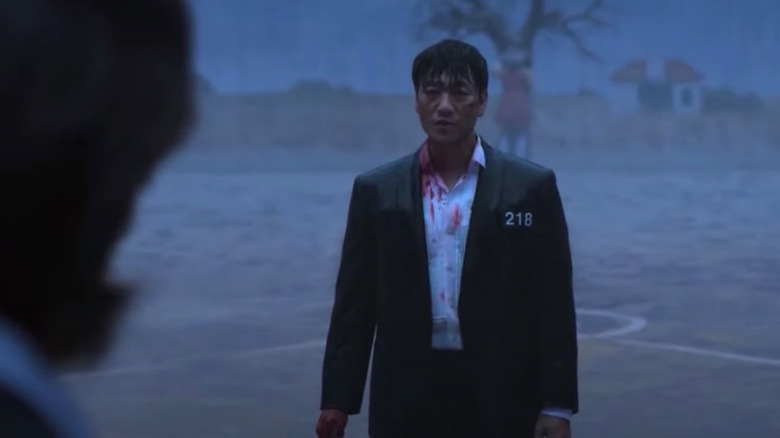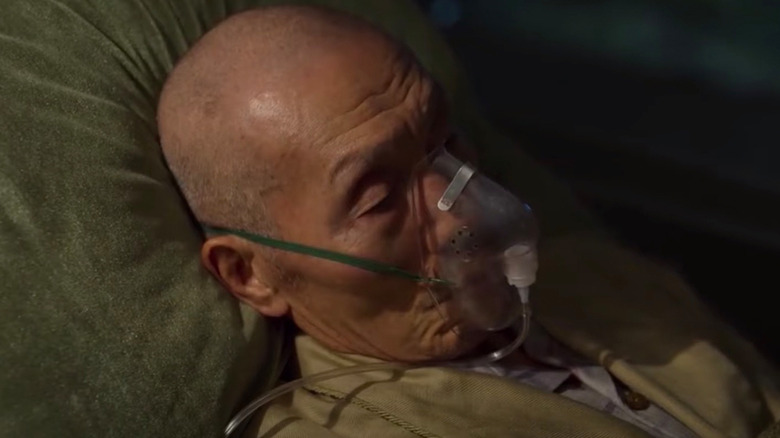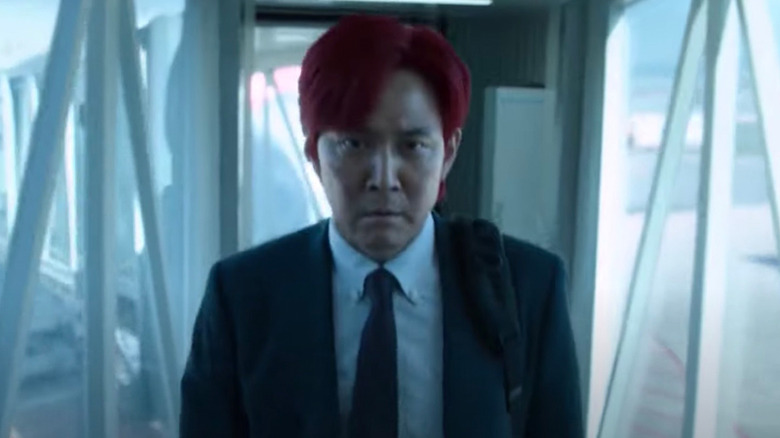The Ending Of Squid Game Season 1 Explained
Warning: spoilers for "Squid Game" below.
"Squid Game" is the new South Korean thriller that's been tearing up Netflix since it premiered on Sept. 17, 2021. Over its nine-episode first season, "Squid Game" offers up a uniquely violent premise that is equal parts "The Hunger Games," "The Purge," and the 2014 Japanese thriller "As the Gods Will." However, the first season of "Squid Game" isn't just a nearly 10-hour shock-fest. It also has something to say about the world we live in.
Lee Jung-jae starts as Seong Gi-hun, a man who is down on his luck in nearly every way. Then one day, a mysterious stranger offers him an opportunity — the chance to compete against 455 other desperate people for a life-changing amount of money. Unfortunately, it turns out the competition in question is a series of sadistic children's games in which contestants are forced to cheat to the death. As Gi-hun fights to survive, he discovers more about both the contest itself, and what he may be capable of as a person.
At the end of the first season, Gi-hun does win the contest, but it's about as hollow as a victory can get. Here's what the end of "Squid Game" Season 1 is all about.
Gi-hun and San-woo represent two sides of the same coin
The competition comes down to two contestants: Gi-hun, and his childhood best friend Cho Sang-woo (Park Hae-soo). The final competition starts off with a coin flip, which is a symbolic representation of who these men are.
Gi-hun is the guy who tried to do everything right in life. He worked hard, played by the rules, believed in the system, and still ended up nearly destitute. San-woo, on the other hand, is the guy who took shortcuts to get ahead. Before the games, he was a wanted criminal who embezzled from his clients. Just like the coin flip that starts the game, all their choices were illusory, because both men wound up in the same place. They're just two sides of the same coin.
As the game plays out, Gi-hun defeats San-woo, but he also comes to see how rigged the game really is. He refuses to kill his former pal, and by offering mercy, he rebels against the game. But this is a futile gesture, because San-woo takes his own life in order to hand the win to Gi-hun.
Gi-hun "wins," but by this point he's already lost everything that matters. The show picks up one year after Gi-hun's "victory." His life isn't much different. Yes, he has the money. But while he was away competing, his mother died, and his ex-wife took his daughter to Los Angeles. And as a result of everything that has happened, Gi-hun has all but given up on life.
The Season 1 finale asks the big question: are people inherently selfish?
To make matters worse, there's still one more gut punch for Gi-hun to endure. After the time jump, Gi-hun gets an invitation from Contestant 001 (Oh Young-soo), whom he befriended during the contest. Not only is 001 still alive, he also reveals himself to be the mastermind of the games. After being diagnosed with a terminal illness, 001 created the deadly games for his own amusement and that of his friends.
Gi-hun is enraged to learn that the rich and powerful treated him and 454 other people like playthings. He's even more outraged when 001 tells him that he believes people are fundamentally selfish. 001 and Gi-hun notice a dying homeless man out the window of their hospital, and to prove his point, 001 bets Gi-hun that nobody will help. When people do help, Gi-hun undergoes a transformation. Having witnessed the kindness of strangers firsthand, Gi-hun knows what he has to do: stop the games from continuing. 001 has already been proven wrong. All that's left to do is undo the terrible contest he's created.
Going red is more than just a hair color choice
The colors red and green are important throughout the series. The first game in the contest is the Korean version of "Red Light, Green Light." Everyone organizing the contest wears red, while everyone competing wears green. Red and green symbolize power and powerlessness, respectively.
After the time jump, when Gi-hun learns that the people running the contest are just bored rich folks who created it for their own amusement, he undergoes a literal transformation by dying his hair red. Gi-hun has moved over to the ranks of the powerful. And unlike the contest organizers, he uses his new wealth for good, by helping the family members of several other contestants.
However, Gi-hun can only do so much. To his horror, he learns that the games are still happening. Season 1 ends with a red-haired Gi-hun making a threatening phone call to the contest organizers, vowing to bring them all down.
Is he an avenging symbol of the underclass? Yes, but not everything is quite so inspiring. When Gi-hun heads off to continue his work, he also walks away from a flight to L.A. that would have taken him to see his daughter. Heading into Season 2, Gi-hun might become an avenger of the powerless ... but he also might lose whatever shreds of humanity he has left.



